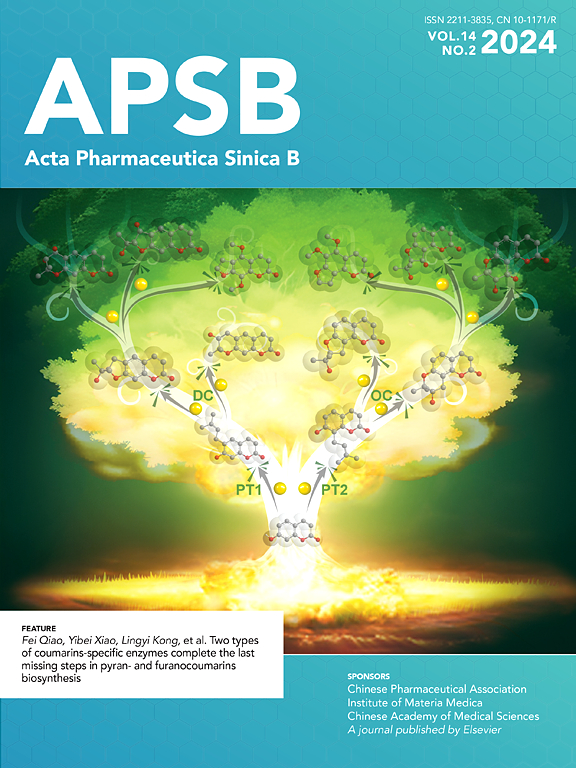蛋白精氨酸甲基转移酶PRMT1通过抑制ripk1介导的坏死坏死和细胞凋亡改善脑缺血再灌注损伤
IF 14.6
1区 医学
Q1 PHARMACOLOGY & PHARMACY
引用次数: 0
摘要
受体相互作用蛋白激酶1 (Receptor-interacting protein kinase 1, RIPK1)在脑缺血再灌注(ischemia-reperfusion, I/R)损伤中起着重要的调控作用。然而,大脑I/R损伤后RIPK1激酶活性的调控在很大程度上仍然未知。本研究发现,脑I/R损伤诱导蛋白精氨酸甲基转移酶1 (PRMT1)下调,与RIPK1的激活呈负相关。在机制上,我们证明了PRMT1直接与RIPK1相互作用并催化其不对称二甲基精氨酸,从而阻断RIPK1的二聚化并抑制其激酶活性。此外,药物抑制或基因消融PRMT1通过促进RIPK1介导的坏死坏死和细胞凋亡而加重I/R损伤,而PRMT1过表达通过抑制RIPK1激活来保护I/R损伤。我们的研究结果揭示了RIPK1激活的分子调控,并证明了PRMT1将是治疗缺血性卒中的潜在治疗靶点。本文章由计算机程序翻译,如有差异,请以英文原文为准。

The protein arginine methyltransferase PRMT1 ameliorates cerebral ischemia–reperfusion injury by suppressing RIPK1-mediated necroptosis and apoptosis
Receptor-interacting protein kinase 1 (RIPK1) plays an essential role in regulating the necroptosis and apoptosis in cerebral ischemia-reperfusion (I/R) injury. However, the regulation of RIPK1 kinase activity after cerebral I/R injury remains largely unknown. In this study, we found the downregulation of protein arginine methyltransferase 1 (PRMT1) was induced by cerebral I/R injury, which negatively correlated with the activation of RIPK1. Mechanistically, we proved that PRMT1 directly interacted with RIPK1 and catalyzed its asymmetric dimethylarginine, which then blocked RIPK1 homodimerization and suppressed its kinase activity. Moreover, pharmacological inhibition or genetic ablation of PRMT1 aggravated I/R injury by promoting RIPK1-mediated necroptosis and apoptosis, while PRMT1 overexpression protected against I/R injury by suppressing RIPK1 activation. Our findings revealed the molecular regulation of RIPK1 activation and demonstrated PRMT1 would be a potential therapeutic target for the treatment of ischemic stroke.
求助全文
通过发布文献求助,成功后即可免费获取论文全文。
去求助
来源期刊

Acta Pharmaceutica Sinica. B
Pharmacology, Toxicology and Pharmaceutics-General Pharmacology, Toxicology and Pharmaceutics
CiteScore
22.40
自引率
5.50%
发文量
1051
审稿时长
19 weeks
期刊介绍:
The Journal of the Institute of Materia Medica, Chinese Academy of Medical Sciences, and the Chinese Pharmaceutical Association oversees the peer review process for Acta Pharmaceutica Sinica. B (APSB).
Published monthly in English, APSB is dedicated to disseminating significant original research articles, rapid communications, and high-quality reviews that highlight recent advances across various pharmaceutical sciences domains. These encompass pharmacology, pharmaceutics, medicinal chemistry, natural products, pharmacognosy, pharmaceutical analysis, and pharmacokinetics.
A part of the Acta Pharmaceutica Sinica series, established in 1953 and indexed in prominent databases like Chemical Abstracts, Index Medicus, SciFinder Scholar, Biological Abstracts, International Pharmaceutical Abstracts, Cambridge Scientific Abstracts, and Current Bibliography on Science and Technology, APSB is sponsored by the Institute of Materia Medica, Chinese Academy of Medical Sciences, and the Chinese Pharmaceutical Association. Its production and hosting are facilitated by Elsevier B.V. This collaborative effort ensures APSB's commitment to delivering valuable contributions to the pharmaceutical sciences community.
 求助内容:
求助内容: 应助结果提醒方式:
应助结果提醒方式:


